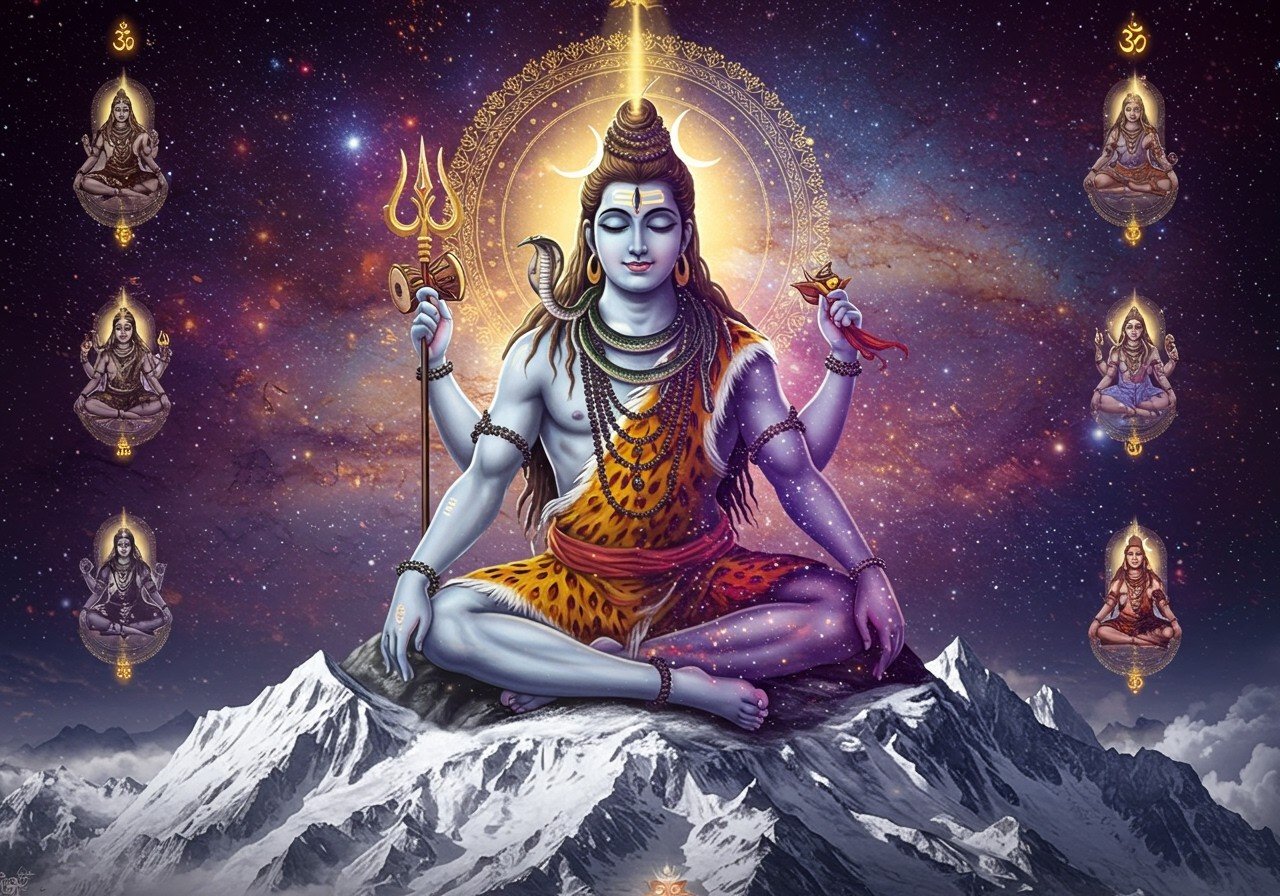Understanding Lord Shiva in Advaita Vedanta

In our rich Indian tradition, Lord Shiva holds deep cultural and spiritual meaning. Exploring Shiva through the lens of Advaita Vedanta, a non-dualistic Hindu philosophy, gives us a unique perspective on the idea of unity in consciousness and reality. For those of us strongly connected to Indian culture, this exploration strengthens our bond with our spiritual heritage.
Advaita Vedanta, a profound philosophical system within Hinduism, emphasizes the non-duality of Atman (our individual soul) and Brahman (the ultimate reality). It teaches that the material world, as we perceive it, is an illusion (Maya). True understanding comes from recognizing the inherent unity of our soul with the ultimate reality. Adi Shankaracharya played a pivotal role in organizing and spreading these teachings far and wide.
When we see Lord Shiva through this framework, He becomes a symbol of Brahman itself, the ultimate reality. He embodies infinite consciousness, transcending the limitations of material existence. His iconic attributes, like the third eye, represent deep spiritual truths and the dispelling of ignorance. Engaging with these teachings can provide a truly profound understanding of our spiritual roots.
Delving into Shiva Advaita Vedanta
Shiva Advaita Vedanta, also known as Śiva Viśiṣṭādvaita, presents a beautiful blend of philosophy and spirituality. Founded by Śrīkaṇṭha Śivācārya, this school focuses on the non-duality of Shiva and Brahman. Think of it like seeing both the forest and the trees – each tree unique, yet inherently part of the larger whole.
Core Beliefs of Shiva Advaita
-
At the heart of this philosophy lies the belief that Shiva and Brahman are one and the same. Shiva is not just the creator but also the very essence of creation. Through His dynamic energy, Shakti, He shapes and sustains the universe.
This act of creation is seen as a divine play (Lila), a joyful expression of Shiva’s boundless creativity.
-
Importantly, Shiva remains untouched by the world He creates. Imagine an artist stepping back to admire their painting – similarly, Shiva transcends His creation, residing in a radiant paradise.
This luminous realm is accessible to liberated souls, who, freed from worldly attachments, can join Him in eternal bliss.
-
We humans are integral threads in this grand cosmic tapestry. Our individual souls, while not merging completely with Brahman/Shiva, reflect His divine qualities.
We are endowed with free will and Shiva, in his infinite compassion, responds to our actions according to the law of karma.
Connecting with Shiva: The Path to Liberation
The journey towards liberation involves purification of the self, devotion, and deep meditation on Shiva as the inner Self, residing within the spiritual heart. Cultivating inner peace, unwavering faith, and detachment from worldly desires brings us closer to this ultimate freedom. This spiritual journey, however, ultimately depends on Shiva’s grace, much like a flower opening to the warmth of the sun.
Historical Context and Influence of Shiva Advaita
-
Shiva Advaita emerged in Southern India as a harmonious bridge between Vedanta and Siddhanta philosophies, gaining prominence in the 16th century.
It offered new perspectives on ancient wisdom, providing a fresh understanding of our connection with the divine.
-
While it shares similarities with Ramanuja’s Viśiṣṭādvaita, Shiva Advaita uniquely positions Lord Shiva as the Supreme Being.
Appayya Dikshita, a renowned scholar, further developed this philosophy by adding his insightful commentaries on Shrikantha’s work.
While Shrikantha viewed his Brahma Sutra Bhasya as qualified non-dualism, Appayya affirmed a form of pure non-dualism, adding another layer to this intricate philosophy.
Rituals and Practices in Shiva Advaita
Rituals dedicated to Lord Shiva beautifully reinforce these teachings. Abhishekam, the ceremonial bathing of Shiva Lingams, symbolizes purification and renewal. Chanting powerful Rudra hymns connects devotees to cosmic consciousness. These practices serve as guideposts on our spiritual journey, aligning us with the core principles of Advaita Vedanta.
Relevance of Shiva’s Teachings in Modern Times
Even in today’s fast-paced world, Lord Shiva’s teachings offer a sense of clarity amidst the chaos. They help culturally rooted Indians like us reconnect with our rich spiritual heritage. Digital platforms, thankfully, make these teachings more accessible, fostering a sense of community where insights and experiences can be shared.
Shiva Advaita Vedanta encourages us to look beyond the illusion of duality. By understanding Shiva as both the creator and the creation, we find peace in knowing that we are part of something vast and divine. Poojn.in is proud to support your spiritual journey by offering a curated selection of holy books that delve deeper into these profound philosophies.
Connecting with Lord Shiva through Poojn.in
At Poojn.in, we offer a wide array of authentic puja items for Lord Shiva’s worship, carefully curated to align with the principles of Advaita Vedanta. These sacred items can help you focus on the formless Brahman while using symbolic forms as stepping stones in your spiritual practice.
Our thoughtfully chosen selection for Shiva puja includes:
- Pure copper and brass items for Abhishekam, like this exquisite Marble Dust Shiva Lingam.
- Traditional Rudraksha malas in various Mukhi options, alongside premium dhoop and incense for your daily puja.
- Authentic Vibhuti (sacred ash) sourced from certified origins.
- Bilva leaves and other sacred offerings.
- Pure silver items ideal for temple worship.
- Specially crafted Shiva Lingams in various sizes and materials, including natural crystal Shiva Lingams.
Every item at Poojn.in undergoes rigorous quality checks and comes with secure packaging. Our dedicated team verifies the authenticity and purity of every product before it reaches you.
For personalized guidance on choosing the perfect puja items, reach out to us:
- Phone: 03369029784
- WhatsApp: 9476142738
Visit www.poojn.in to explore our full collection of Shiva puja items. We offer pan-India delivery with secure and respectful packaging, ensuring the sanctity of your puja samagri.
Embracing the Wisdom: A Path to Purpose and Grace
Embracing Shiva Advaita Vedanta opens a path that honors our heritage while offering profound spiritual insights. It encourages us to see the divine presence of Shiva in everything, acknowledging the sacred essence that permeates all of life. As we navigate our daily lives, these teachings remind us to seek balance, harmony, and inner peace.
By understanding our connection to Lord Shiva, we develop a deeper appreciation for the world around us. Tradition and modernity converge as we explore these time-honored teachings, made even more accessible through digital platforms that facilitate learning and sharing. Whether through meditation, ritual practices, or philosophical study, Shiva Advaita Vedanta offers a timeless guide to living with purpose and grace. May Lord Shiva’s wisdom illuminate our path, leading us closer to liberation and eternal joy. You can explore more about Lord Shiva and other deities in our informative articles: Lord Shiva: The Destroyer Deity in Hindu Religion and Lord Brahma: The Creator Deity in Hindu Religion.
Shiva in Advaita Vedanta: Frequently Asked Questions
What is the essence of Advaita Vedanta? Advaita Vedanta, a cornerstone of Hindu philosophy, teaches the principle of non-dualism. Simply put, it means that our individual soul (Atman) and the universal soul (Brahman) are ultimately one and the same, not separate entities.
How does the concept of Shiva integrate into Advaita Vedanta? In Advaita Vedanta, Shiva represents Brahman, the ultimate reality. He symbolizes the fundamental unity of all existence and consciousness.
Why does Shiva hold such significance in Advaita Vedanta? Shiva is crucial because he embodies the very core of oneness and non-duality. He guides followers towards a deeper understanding of the true nature of reality and their own inherent self.
Is Shiva worshipped as a personal deity within the framework of Advaita Vedanta? While Shiva is seen as the ultimate reality, the emphasis in Advaita Vedanta is more on self-realization and understanding the inherent oneness of all things, rather than the worship of deities in the traditional sense.
What is the role of meditation on Shiva in Advaita Vedanta? Meditating on Shiva helps practitioners focus on the profound concept of non-duality and the essential oneness of the individual self with the universe. This practice serves as a powerful tool for achieving self-realization.
How does Shiva Advaita distinguish itself from other forms of Shiva worship? Shiva Advaita places a strong emphasis on understanding and realizing the non-dual nature of existence, while other forms of Shiva worship may focus more on rituals, prayers, and devotional practices.
Is Advaita Vedanta the sole philosophy that incorporates Shiva? No, Lord Shiva is a central figure in various other philosophies and sects, including Shaivism, where He is revered as the Supreme God. The interpretations of Shiva’s role and nature, however, can differ significantly across these traditions.
Can someone embrace the teachings of Advaita Vedanta without directly worshipping Shiva? Yes, absolutely. Followers can concentrate on the philosophical principles of non-duality and self-realization without necessarily worshipping Shiva as a personal deity. The path is about understanding the unity of existence.


